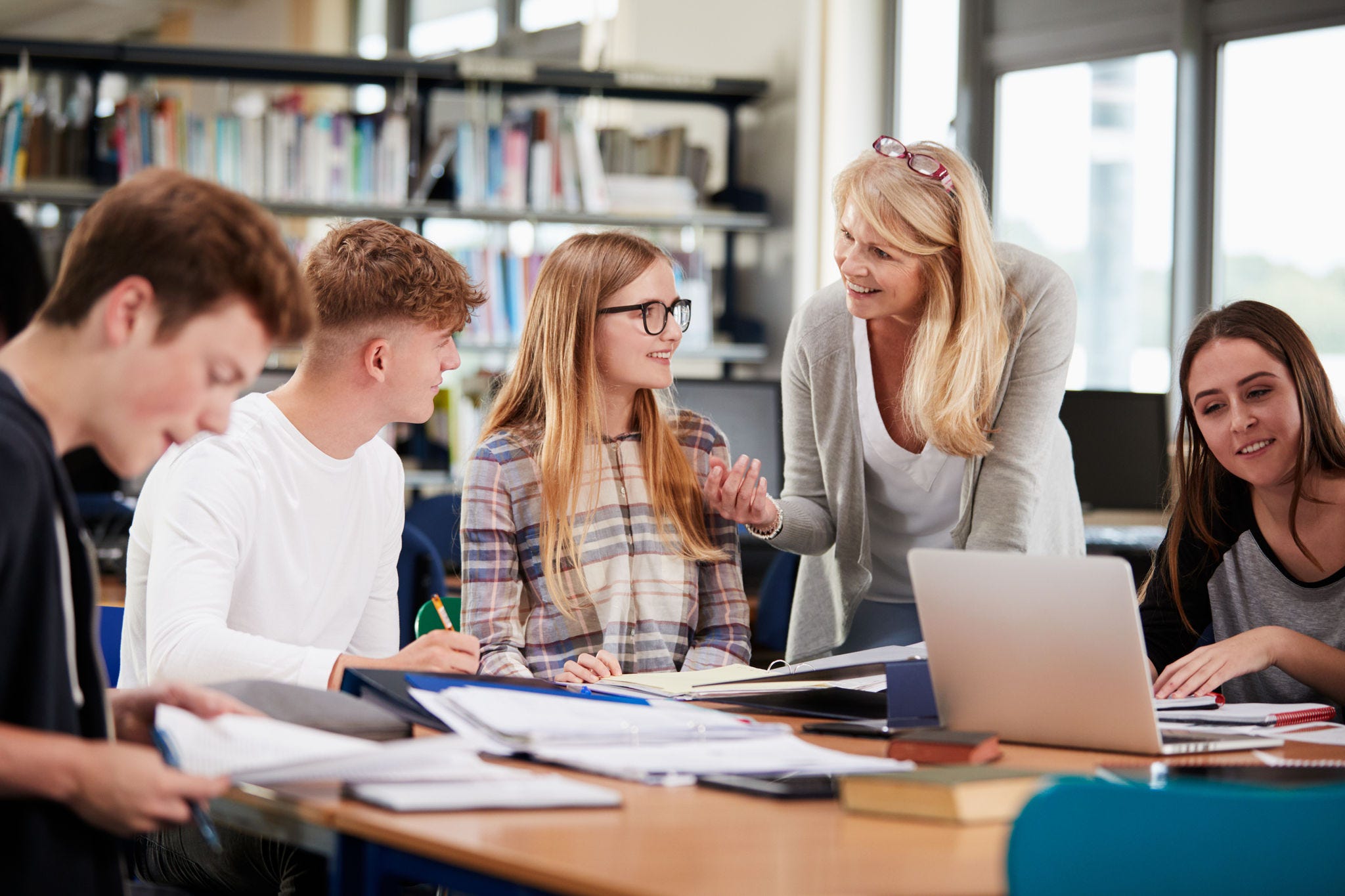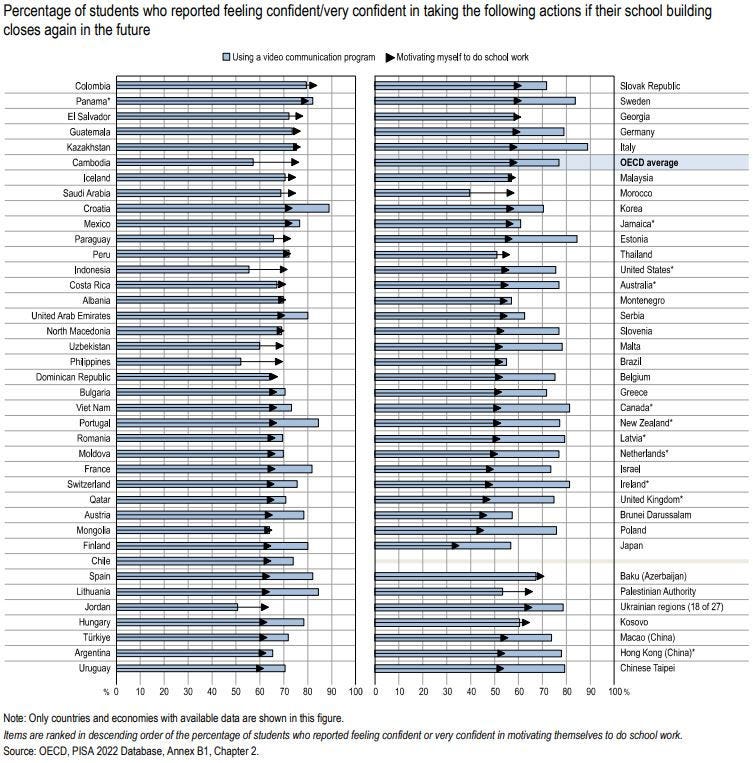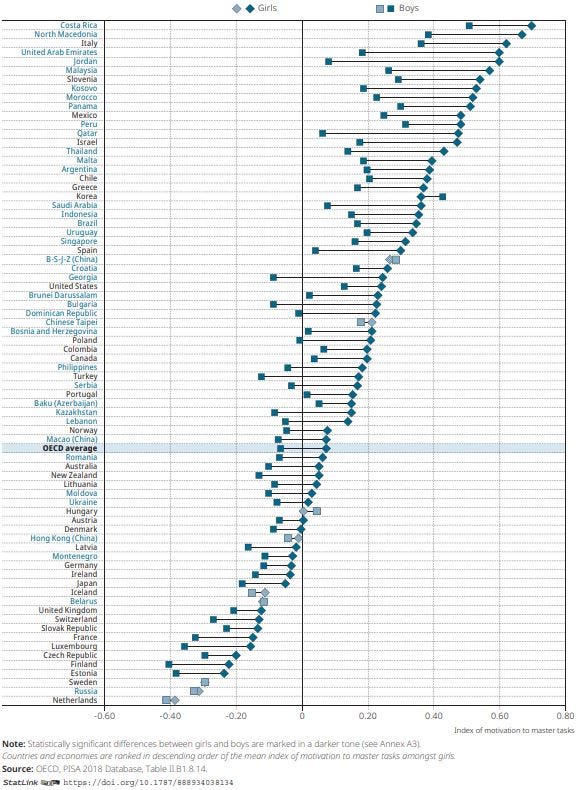Students who excel in mathematics tend to have lower anxiety about mathematics, a consistent finding across PISA studies. In PISA 2022, this trend persisted globally. Positive attitudes toward mathematics and learning can mitigate math anxiety's negative impact on performance. Cultivating a growth mindset, believing in the development of abilities over time, is one such attitude that can help alleviate mathematics anxiety.
Student engagement and motivation
Engagement and motivation are vital for learning as they support the acquisition and retention of knowledge and skills. Students need confidence and motivation for success; without these elements, students can struggle to obtain high-level skills.

Key messages
PISA 2022 findings reveal that while most students rarely faced learning challenges during COVID-19 school closures, many struggled with self-motivation. Access to digital devices and study space wasn't a major issue, but motivation posed significant hurdles. On average across OECD countries, almost half of students indicated they had problems motivating themselves to do schoolwork at least once a week.
PISA data consistently show that engagement in reading is strongly correlated with reading performance and is a mediator of gender or socio-economic status. Engagement in reading acts as a possibly powerful lever in enhancing reading proficiency and decreasing gaps between groups of students.
Context
Students less confident about motivating themselves to learn
PISA 2022 shows that, on average across OECD countries, about three out of four students reported that they feel confident or very confident about using a video communication programme, while only six out of ten students felt so about motivating themselves to do schoolwork.
Students' confidence in self-directed learning (2022)

Gender difference in the motivation to master tasks
The motivation to master tasks is defined as the dispositional desire to work hard to achieve a goal. On average across OECD countries, the index of motivation to master tasks was higher amongst girls than amongst boys.
Gender gap in motivation to master tasks (2018)

Related publications
Programmes and projects
-
PISA is the OECD's Programme for International Student Assessment. PISA measures 15-year-olds’ ability to use their reading, mathematics and science knowledge and skills to meet real-life challenges.Learn more
-
Understanding the nature of 21st Century childhood is crucial for an education that is increasingly expected to support students to thrive in both a digital and non-digital world, delivering academic learning while also building physical and emotional well-being. This has implications for the skills, capacity and resources required.Learn more
-
The Education Policy Outlook is an analytical observatory that monitors the evolution of policy priorities and policy developments from early childhood education to adult education, mainly among OECD education systems, to provide a comparative understanding of how policies are evolving, and how they can be best implemented or improved over time.Learn more
-
The OECD’s programme on education and skills policy support policymakers in their efforts to achieve high-quality lifelong learning, which in turn contributes to personal development, sustainable economic growth, and social cohesion.Learn more
-
Education for Inclusive Societies Project is designed to respond to the increasing diversity that characterises education systems, and seeks to help governments and relevant stakeholders achieve more equitable and inclusive education systems as a pillar to create more inclusive societies.Learn more
-
OECD Future of Education and Skills 2030 aims to build a common understanding of the knowledge, skills, attitudes and values students need in the 21st century.Learn more
-
Add a short description – maximum 200 characters (4 lines). This should outline the OECD’s mandate and the main issues/challenges with respect to the project. Writing style and tone should be clear, to the point, and jargon-free.Learn more
-
The PISA-based Test for Schools provides school-level estimates of performance and information about the learning environment and students’ attitudes gathered from student questionnaires. Find out more and how schools and their networks can take part.Learn more
-
Since 2013, the OECD has gathered evidence on how school resource policies work in different contexts. The focus is now on digital resources to enable countries to learn from each other in the digital transformation of their education.Learn more
-
Meeting the challenges of the 21st Century means that schools must be empowered to play a more central and active role in leading improvements in education. To support this, Schools+ will bring together major education networks to put schools at the centre of education design.Learn more
-
Data and digital technologies are among the most powerful drivers of innovation in education, offering a broad range of opportunities for system and school management, as well as for teaching and learning. But they also create new policy issues as countries face challenges to reap the benefits of digitalisation in education while minimising its risks.Learn more
-
TALIS - the Teaching and Learning International Survey - is the world's largest international survey about teachers and school leaders.Learn more
-
Creativity and critical thinking prepare students for innovative economies and improve wellbeing. However, educators often lack guidance on how to equip students with creativity and critical thinking within subject teaching. Education systems have likewise rarely established ways to systematically assess students’ acquisition of creativity and critical thinking.Learn more
-
Preparing for the future means taking a careful look at how the world is changing. Reflecting on alternative futures helps anticipate and strategically plan for potential shocks and surprises.Learn more






